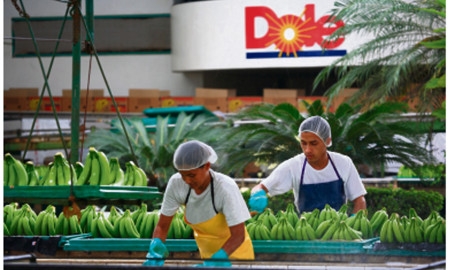Founded in Hawaii by James Drummond Dole in 1851, Dole started off cultivating pineapples. The company was quickly successful and wasted no time in exporting all kinds of fruits and vegetables. Currently Dole operates in more than 90 countries and is a reputable company known throughout the world for its dedication to quality.
A key moment for the company in recent times came in 2003, when David H. Murdock bought 100% of the company’s shares.
Dole Ecuador began operating in 1955 under the name of the Standard Fruit Company, and was then a part of the Standard Fruit & Steamship Company.
The business has gone from strength to strength through the cultivation of non-traditional products such as bananas, mangoes, cooking bananas and the melon pear, and is recognized worldwide for the quality of its products.
It was the success and rising volume of exports that led the company to build a private port in Guayaquil in 2002 in a bid to achieve continued growth. The investment reached a total of $28 million and has the capacity to house 2,000 TEU containers. The port is also used by third parties and has been key to the economic boom experienced in Guayaquil in recent years.
The decision to build the port was a direct result of the ISO 9001 quality certificate attained by UBESA Dole in 1997.
| The Dole Foundation develops health, community and education programs in the areas where the company operates |
The commitment to quality across the Dole Corporation extends to social areas, where the company leads in aspects related to the environment, labor laws and employee security. The European press has pointed out on more than one occasion that the Dole Corporation is the only Latin American company that fumigates its fields, as demanded by international law, without endangering the company’s workers or any of the local population.
The company works closely with the Ecuadorian Federation of Agricultural, Rural and Indigenous Workers (FENACLE) and is the only company affiliated to a union. One reason more why the company was awarded the ISO 14000 certificate for environmental management.
The Unión de Bananeros Ecuatorianos S.A. (UBESA) sells the best crops that Dole produces in Ecuador. Using only the best independent producers guarantees the very finest quality of fruit ends up with the consumer at the end of the chain.
The Dole Foundation has also opened 21 health centers that dispense both medical attention and advice about the prevention of illness. This is a key activity in the company’s community development program and is used by 15,000 families who take advantage of the best possible medical attention and even surgery in some cases. These centers are built next to farming areas and mean that anyone who is ill does not have to make a trip into Guayaquil, however if they do they have access to an excellent Dole Foundation medical center in the port area.
The Dole Corporation has in total 1,115 hectares of banana plantations that have been farmed with zero environmental impact since 1998, the year in which the Organic Banana Program came into being.
Education is another key area for the company and it has two schools in the Guayas province with programs dedicated to child nutrition. This education is combined with continuous training for workers and their families.
In addition, two more companies have been created in the last three years: one dedicated to the manufacture of working clothes and another that makes netting for the protection of fruit. This trend of creating new companies is focused on areas where the corporation’s schools are housed and where workers of the Dole Corporation live.
Equally as important are the health training workshops and the medical days organized by the Dole Foundation. These concentrate on aspects of hygiene, nutrition, dental care, the control of blood pressure, eyesight testing and the prevention of hepatitis B, which is of significant importance to the area as the World Health Organization has indicated that Ecuador and neighboring Peru are two countries where the disease has a high impact.

0 COMMENTS